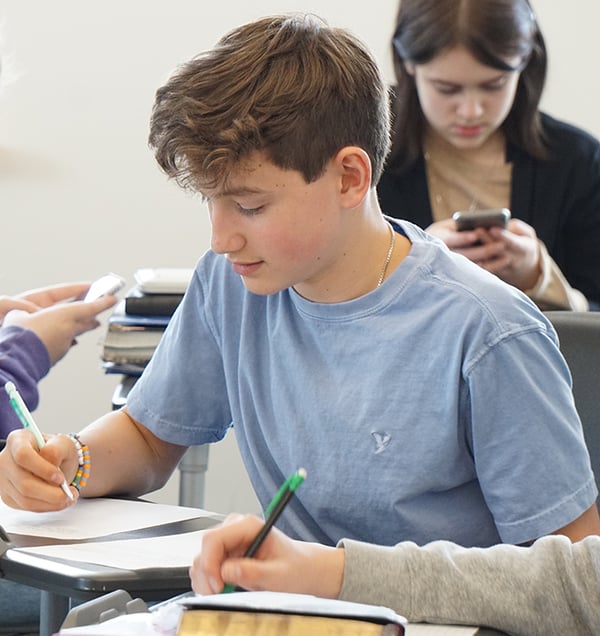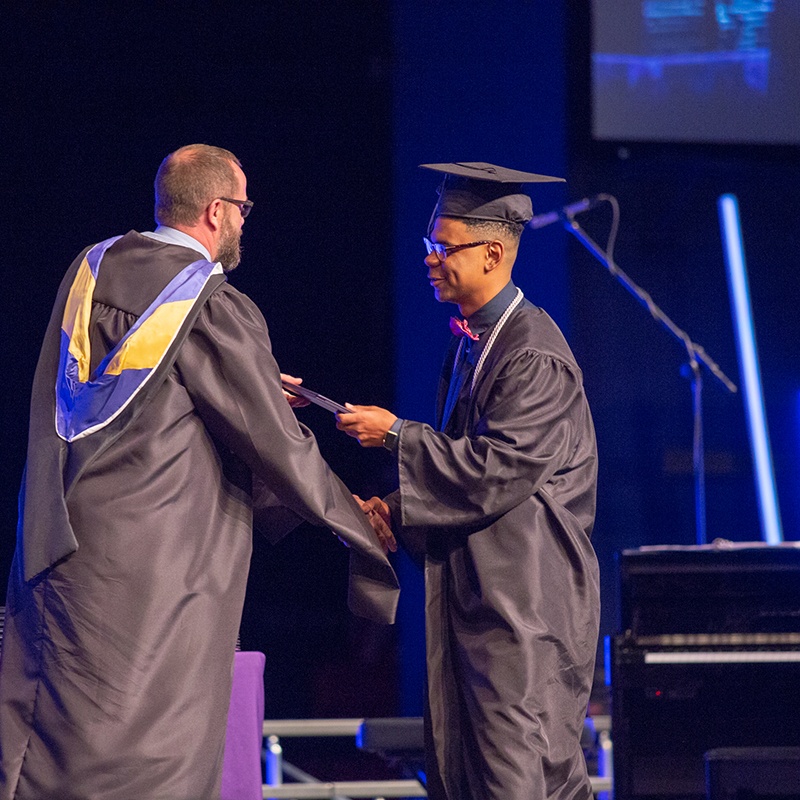What is the Purpose of Education?
What's the purpose of education? We believe it's developing the whole student, building on God-given talents, and preparing them to be lights to the world.
BY Hannah Buchholz
The four years of high school will shape your student’s future. There’s a lot to consider when choosing a high school. But really, your decision hinges on one key question: What is the purpose of education?
Every educational approach reflects a distinct philosophy. Montessori schools emphasize nurturing a child’s natural curiosity, allowing them to pursue knowledge through self-motivation. Classical schools focus on teaching students how to think and learn. Public schools prioritize providing access to education for all.
At Lutheran High School, our mission statement states the purpose of education: Nurturing Academic Excellence and Encouraging Growth in Christ. On a year-over-year basis, this means empowering students to:
- Pursue their passions
- Discover and grow in their God-given giftedness
- Take ownership of their learning to gain independence
Nurturing academic excellence is rooted in the idea that education should empower students to think critically, rather than depending on others' ideas. In this article, we’ll discuss how students progress from memorization to independent thinking, ultimately enabling them to contribute original ideas for the benefit of others.
1. Moving away from memorization to critical thinking skills
Memorization can be very useful in the early years of education. Memorized facts can be easily pulled to mind. It’s a necessary foundation for completing more complex mental tasks.
For example, many of us memorized Bible verses in Sunday School, and even years later, we can recall those words of comfort or guidance without much mental effort. A memorized verse acts as the foundation for applying scriptural truths to our lives.
However, at the high school level, education must move beyond memorization. In our Google-driven world, with information readily available at the tap of a finger, we focus on teaching students how to engage with information critically. Instead of simply recalling facts, LuHi students are challenged to internalize information, question it, and apply it in new contexts. This develops their ability to think independently.
Education addresses knowledge deficiencies. But more importantly, it teaches students how to think for themselves. Without the ability to think independently, students are left reliant on others for answers. True critical thinking means breaking free from this dependence — achieving intellectual independence.

2. Fostering Independence Through Critical Thinking
Just as memorization serves as a foundation for critical thinking, critical thinking is the foundation for becoming an independent learner. As poet William Butler Yeats said, “The aim of education is the knowledge of how to study, not the possession of knowledge; the power of critical thinking, not the accumulation of facts."
Critical thinking is an education buzzword, but here’s what we mean: Students are to actively engage in their learning so they can contribute original ideas.
It’s deeper thinking beyond information regurgitation. Information regurgitation is the result of never moving beyond memorization. And it devalues a student’s education experience.
As LuHi Dean of Academics Tim Thomack says, “Critical thinking must be modeled. It’s a deeper space that can be difficult to get to. It requires intentionality, commitment, time, practice, knowledge of the topic and application of that knowledge to thoughtfully evaluate the situation. When we get into this deeper space of thinking, it pushes students to contribute original thoughts because they offer the efforts of their own brains. They are not just matching the ideas they already heard.”
Highly relational teachers at LuHi don’t want students to passively absorb information. They draw out student’s ability to wrestle with, question, and make applications from their knowledge. Instead of teachers connecting the dots for their students, students are expected to connect the dots.
It’s like hiking. Brand new hikers rely on a clearly defined trail and cairns to mark the way. More experienced hikers need less guidance to reach the final destination. A topo map and a compass may be all an orienteering hiker needs to find their way.
It’s the same for students. The more experienced learner they become, the fewer breadcrumbs they need. Highly talented teacher engage students using this progression. This kind of engagement leads to problem-solving and, in turn, fosters independence.
Here are some examples of what this looks like in classes:
- In Spanish class, students don’t just learn vocabulary words. Instead, they consider the impact that speaking someone’s “heart language” has on communication.
- In Theology class, students learn the truths of scripture to answer the 4 Questions.
- In Science class, students start by learning a concept and move to answer the ‘why’ behind the theory.
- In Literature class, students analyze deeper meanings an author conveys through storytelling and discuss how these themes relate to their own lives today.
When students think critically and problem-solve on their own, they experience a new sense of freedom. Think back to when your student was a toddler. Do you remember the sense of pride they felt when they mastered a new skill, like tying their own shoes. That simple act of independence is liberating—and the same is true for high school students as they grow into independent thinkers. Independence isn’t just empowering; it’s essential for adulthood and success in life.
3. From Independence to Service
As students gain independence, they experience a greater freedom—the freedom to look beyond themselves. In his first letter to the Corinthians, Paul writes, “When I was a child, I spoke like a child, I thought like a child, I reasoned like a child. When I became a man, I put aside childish things” (1 Corinthians 13:11). Paul ties this idea of maturity to love, teaching that as we grow, we learn to look outward, serving others instead of focusing on ourselves.
At LuHi, we see this transformation in our students. With independence and maturity, what are they liberated from? Their own selfish desires.
As students develop critical thinking skills and gain independence, they mature emotionally and spiritually. They learn to move beyond self-centered desires and take responsibility for the well-being of others. Love is inherently selfless. And true maturity comes when students use their freedom not just for their own benefit but to be the hands and feet of Jesus in their community.
This is the heart of a LuHi education. We don’t just prepare students for academic success or professional achievement; we equip them to serve. As they grow in independence, they also grow in their ability to be a blessing to others, using their gifts and talents for God’s purposes.
The ultimate purpose of education at LuHi is not just to fill minds with knowledge but to empower students to think independently and serve selflessly. To read more on this topic, check out our blog post on the Hallmarks of a LuHi Grad.
Originally published in 2020, updated for accuracy in 2024.



.JPG.jpg)
